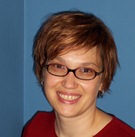- About Archives
- About SAA
- Careers
- Education
- Publications
- Advocacy
- Membership
 Professional Experience: Head of Digital Programs, Amherst College, 2010–present. Digital Interfaces Librarian, University of Massachusetts Amherst, 2007–2010. Five College Project Archivist (for the Archivists’ Toolkit), Mount Holyoke College, 2004–2006. Project Director, Five College Finding Aids Access Project, Mount Holyoke College, 2001–2004. Archivist, Environmental Design Archives, University of California, Berkeley, 1998–2000.
Professional Experience: Head of Digital Programs, Amherst College, 2010–present. Digital Interfaces Librarian, University of Massachusetts Amherst, 2007–2010. Five College Project Archivist (for the Archivists’ Toolkit), Mount Holyoke College, 2004–2006. Project Director, Five College Finding Aids Access Project, Mount Holyoke College, 2001–2004. Archivist, Environmental Design Archives, University of California, Berkeley, 1998–2000.
Education: MS, Library and Information Science, Simmons College, 1998. BA, Art & Design and Anthropology, Iowa State University, 1992.
Professional Activities: Society of American Archivists: Member, Technical Subcommittee on Encoded Archival Description (TS-EAD), 2010–present. Workshop Instructor, "Describing Archives: A Content Standard (DACS)" and "Implementing DACS in Integrated CMS: Using the Archivists' Toolkit," 2006–2010. Technical Subcommittee on Descriptive Standards, Member, 2005–2008. Description Section, Chair, 2004–2005. Description Section, Vice-Chair, 2003–2004. New England Archivists (NEA): Membership Committee, 2002–2007, Co-Chair, 2004–2007. Branding Committee, 2005. Program Committee, 2002–2003. Communication Implementation Task Force, 2003. Visual Resources Association: Instructor, Summer Educational Institute, 2008–2010. Simmons College Graduate School of Library and Information Science: Instructor, 2005–2010 (courses in Archival Access and Use, XML, and Metadata).
Presentations and Publications: Presentations at SAA, NEA, and other regional conferences on EAD, the Archivists’ Toolkit, metadata, usability, and sustainability of digital projects. Selected publications include, “A Brave New World: Archivists and Shareable Descriptive Metadata,” with Jenn Riley, American Archivist, 2009. “The Archivists’ Toolkit: Another Step Toward Streamlining Archival Processing,” with Bradley D. Westbrook, Lee Mandell, Brian Stevens, Jason Varghese, Journal of Archival Organization, 2007. "The MARC Standard and Encoded Archival Description," with Peter Carini. Library HiTech, 2004.
Awards: SAA C.F.W. Coker Award for the Archivists’ Toolkit, project team member with Bradley Westbrook, et al., 2008. SAA CFW Coker Award, 2001, for Standard Series for Architecture and Landscape Records: A Tool for Arrangement and Description of Archival Collections, co-authored with Waverly Lowell.
Question posed by the Nominating Committee: As SAA celebrates its 75th Anniversary, what does it mean to be a SAA leader in the 21st century?
In any century, being an SAA leader means dedication to archival colleagues, to the organization, and to the archival profession. Leaders have a desire to give back to the profession—by actively participating in SAA's Roundtables, Sections, Committees, Task Forces, and working groups; reaching out to and mentoring new archivists; staying abreast of developments in the field; and sharing their knowledge through presentations and publications. They understand the importance of contributing to the field, that engaging with the profession through SAA enriches their work and the work of their fellow archivists. They recognize that raising the visibility of archives and archivists benefits us all.
Great SAA leaders encourage and evaluate input from all quarters, but have their own clear vision. They are able to balance the desires of SAA's many constituencies with an understanding of the needs of the organization as a whole, and to synthesize these voices into the development of a cohesive set of goals that fit into and further the realization of SAA’s strategic priorities. Along the way, they inspire others, bringing out the best in those around them. SAA leaders have enthusiasm and passion that motivates others to get involved, to dedicate themselves to participation in SAA, and to excel in those commitments. They garner the respect of colleagues and invigorate the archival profession and SAA as an organization.
Being an SAA leader in the 21st century means being proactive rather than reactive during a period of increasingly rapid change. Technological, social, and political changes have a tremendous impact on our profession. We need leaders who can identify the opportunities presented by this transformation and capitalize on the potential for archivists to play a vital role in the management and preservation of digital information. It will be critical for SAA’s leaders to stay current with developments in our own profession and those that are related, particularly other disciplines and professions that are contributing to advancements in digital curation and preservation. Given the abundance of digital content being created, our archival perspective, expertise, and long standing principles are essential now more than ever. Our leaders will be those who can not only navigate the changing landscape, but map our way forward.